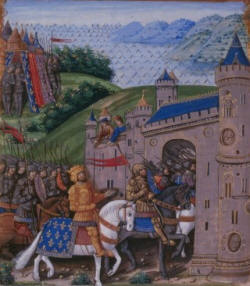

Queer Places:
Auberge La Truie-qui-File, L'Aigle, Orne, Lower Normandy, France (Francia)
 Charles de la Cerda, commonly known as Charles of Spain (French: Charles d'Espagne) (1327 – 8 January 1354), was a Franco-Castilian nobleman and soldier, the son of Alfonso de la Cerda of Spain (died 1327) and Isabelle d'Antoing,[1] and grandson of Alfonso de la Cerda the disinherited (1270–1333). He was a distant cousin of
John II of France. Like
many sodomites in the Middle Ages or ancien régime, he was more of a bisexual
than a homosexual in the modern sense of the word; he took a wife, Bonne de
Luxembourg, and fathered ten children in eleven years. Yet the great love of
his life was Charles de La Cerda, a
childhood friend. La Cerda was given various honours and appointed to the high
position of connétable when Jean became king; he accompanied the king on all
his official journeys to the provinces. La Cerda's rise at court excited the
jealousy of the French barons, several of whom stabbed him to death in 1354.
La Cerda's fate paralleled that of
Edward II's
Piers
Gaveston in England and Juan II's
Alvaro de Luna in Spain: the position of a royal favourite was a dangerous
one.
Charles de la Cerda, commonly known as Charles of Spain (French: Charles d'Espagne) (1327 – 8 January 1354), was a Franco-Castilian nobleman and soldier, the son of Alfonso de la Cerda of Spain (died 1327) and Isabelle d'Antoing,[1] and grandson of Alfonso de la Cerda the disinherited (1270–1333). He was a distant cousin of
John II of France. Like
many sodomites in the Middle Ages or ancien régime, he was more of a bisexual
than a homosexual in the modern sense of the word; he took a wife, Bonne de
Luxembourg, and fathered ten children in eleven years. Yet the great love of
his life was Charles de La Cerda, a
childhood friend. La Cerda was given various honours and appointed to the high
position of connétable when Jean became king; he accompanied the king on all
his official journeys to the provinces. La Cerda's rise at court excited the
jealousy of the French barons, several of whom stabbed him to death in 1354.
La Cerda's fate paralleled that of
Edward II's
Piers
Gaveston in England and Juan II's
Alvaro de Luna in Spain: the position of a royal favourite was a dangerous
one.
A boyhood companion and favorite of John while he was Duke of Normandy, Charles commanded the Castilian galleys at the Battle of L'Espagnols-sur-Mer, where he was defeated by Edward III of England after a long and desperate struggle.[2] Soon after John's accession to the throne, he was appointed Constable of France,[3] filling the vacancy left by the execution of Raoul II, Count of Eu, and created Count of Angoulême. Vacant since the death of Joan II of Navarre in 1349, the title to Angoulême was claimed by her son, Charles II, King of Navarre, who bitterly resented La Cerda's preferment. In 1351, Charles de la Cerda married Marguerite, a daughter of Charles, Duke of Brittany. In 1354, Charles of Navarre and several members of his household set upon and slew de la Cerda in an inn in L'Aigle.[4] The repercussions of this murder led to a continuous state of instability within France that was only resolved upon the accession of Charles V in 1364.
My published books: